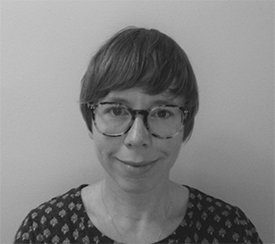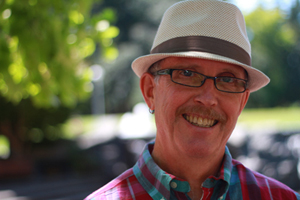I Think It Will Be Okay:
John Barton in Conversation
with Elizabeth Ross

In "Evidence of Disease," which appears in The Malahat Review's Autumn 2016 issue, Elizabeth Ross recounts the shock of being diagnosed with papillary thyroid cancer and the many-branched route she followed imaginatively on the way to recovery, which, as she moves toward it, is in no way guaranteed. She is the author of Kingdom (Palimpsest, 2015), a collection of poems. She lives in Toronto, where she is at work on a new book of poetry and another of linked memoirs. Interview conducted by Malahat editor, John Barton.
Why is a journey an appropriate metaphor for describing the experience of having a life-threatening illness? Which journey is more challenging, diagnosis and treatment or the disease itself?
In my case, diagnosis and treatment felt like the disease. Even though papillary thyroid cancer is frequently regarded by doctors as "the best cancer"—and that is true from a mortality perspective—it's still cancer, and it requires thorough treatment and monitoring. I was pretty wrecked by this paradox. It took a long time to come to terms with my dis-ease, and the journey metaphor was part of my process. Finding a metaphor allowed me to see how the illness threatened my life—the way I thought I was in the world—without being life-threatening in the way aggressive cancers are. The journey helped me find a beginning, and the ending continues with me, off the page.
You juxtapose the story of your illness with another about a road trip from the Pacific to the Atlantic you took with your family when you were thirteen years old. You describe yourself as being hazy throughout this cross-Canada journey as to where you were along the route at any given time, claiming that you "couldn't read maps." This admission is opposite in approach to how you chose to cope with your diagnosis. In what ways did your efforts to understand your illness "locate" you?
I guess I could compare these cartographical processes to induction and deduction. In my inductive teenage world, maps were redundant and uninteresting because everything I felt or intuited was a foregone conclusion, including my death at an old age. When I was diagnosed with thyroid cancer, the maps I read were familial, emotional, and medical, and my process was much closer to deduction. I struggled through hundreds of pages of medicalese, reading journal articles I accessed from my university library account. I think I was trying to become somewhat functional in the language of my illness, which was empowering to me as a writer, but also as a person who believes in language's ability to enfranchise and disenfranchise; having recently received midwifery care, I knew I wanted to be a participant in my healthcare, not only to be "treated." I probably drove my doctors bananas (I saw my lovely surgeon three times, bless her, each time clutching gobs of annotated articles, before I decided to have the lobectomy.) It's easy to forget, in its complex and intimidating language, that the practice of medicine, like poetry, is an essential art; understanding and speaking it, or even attempting to try to understand it, is an act of cartography.
The mastery of the facts of your illness is further counterpointed by a reference to instinct. How did instinct help you manage the flood of information that's inevitable with serious illness and the realization that your illness could dramatically change your life as well as the lives of everyone close to you?
From an information-literacy standpoint, I did a terrible job managing the flood. I wanted to look at it all, even when I knew it was toxic. But instinct helped bridge this disparity; I was almost compulsively looking up information, yet aware that I was driven to do so because it helped me feel better.
I'm not sure what would cause me to google certain phrases or terms and see what would come up. It was kind of like watching a horror movie (something I'm not very good at)—but one of the ways I get through my terror is by reminding myself that there's a set all around the actors, and an artist has applied grotesque make up on that body, this effect is CGI, and so on till I've deconstructed the framework to place the creation in its cultural context. Truly, the Internet is a horror show when you're ill. My management of information often consisted of me thinking, usually out loud to my poor husband, why the information on the screen wasn't relevant, or why it was biased. Moments of profound fatigue, like shutting the laptop, may have been instinct mercifully breaking through.
Instinct is like intuition, though the former is often understood in terms of biology and recognition of our status as animals while intuition is often connected to the emotions, intellect, and even the spirit. Intuition is also crucial to creativity. Can you describe how intuition guided the composition of "Evidence of Disease," which strikes me as intuitively, even poetically, structured?
I love the idea of spiriting a text as it's being written. My intuition, in the sense that I know myself and that I process many things by writing them, led me to keep trying to write about what turned into "Evidence of Disease." My main fear was that I would write a survivor piece, when it was important to me to write about surviving my experience—about surviving myself. Usually when I write, I don't often have that strong a sense of what I want to do—or not do, for that matter.
I had taken a running start at a few poems, but they didn't have the scope of what I needed. They were flatly angry, or funny or smart-alecky, or too compressed to feel like I was on the right track. Luckily, even though the poems weren't working, my brain was quietly working away—I suppose that's the intuition part. As I started to write the first drafts of "Evidence of Disease," I listened the same way I listen to a poem, and it felt right for it to have three parts. I played with a different structure for a bit, but primarily came back to one I'd initially written. Imagery and metaphor also helped show me the parts I was working with.
Your great aunts Orvetta and Olive, whose stories are a major thread through the piece, preside over the narrative like guiding presences similar to the angels in Wim Wender's film, Wings of Desire. Orvetta's and Olive's divergent destinies—the former living to old age, the latter run over and killed by a Greyhound bus before her time—present you with two potential outcomes for your own situation. At what point did you realise they were crucial to the story you needed and wanted to tell?
(I'll have to watch Wings of Desire!) I never consciously thought about either Olive or Orvetta when I was going through treatment and my ensuing anxiety. But after I started to feel better and was struggling with how to write about my experience, they came to mind. One afternoon, my memory of meeting Orvetta surfaced, and I realized the twins' symbolic power, although I wasn't sure how I would integrate their stories with mine. But closely related to your question about intuition, I felt they were right, and I started writing the essay right away. They guided me to a framework from which to tell the story.
"Evidence of Disease" is powerful because it walks the reader through a very intensely lived personal experience. Yet it also shows remarkable emotional restraint. In what ways does metaphor and a complex poetic structure allow a writer to communicate a very difficult story with poise?
Thanks for your kind words. I should note that the essay went through many drafts, and lots of purple prose, then some trusted writer-friends, and then a robust editing process.
I think the compression of poetry helped a great deal (and helps with any genre, for that matter). As I was writing and revising the essay, I started to see how the spaces between images and chronological events, like in poetry, were just as important as expository information. Also, the discipline of writing poetry helped: I wouldn't let myself get away with more information or language than necessary to communicate the experience.
Many feel creative nonfiction has a close relationship to poetry. As a poet yourself, how would you characterize poetry's influence in the composition of "Evidence of Disease"?
Overall, the influence was primarily in the act of composition. I had to accept, in the same way I sit down to write a poem, that I didn't know where I would arrive. And then I had to trust that the process of writing and working with seemingly disparate pieces would help me guide them together. Poetry helped with all of that.
I also had to trust, the same way I do in poetry, that I'd found the right genre to express this experience. Funnily enough, I just told a friend how exposed I feel after the publication of this essay, and how ironic that is because I'll write about anything in poetry. But there's the element of truth in creative nonfiction that opens up and removes the safety of artifice poetry provides. And while there's certainly art to CNF—the essay is a composition, after all—it's not housed in the same safe shelter, so this exposure is a new feeling for me. But again, in the way I trust poetry, I think it'll be okay.
* * * * * * * * *

John Barton









